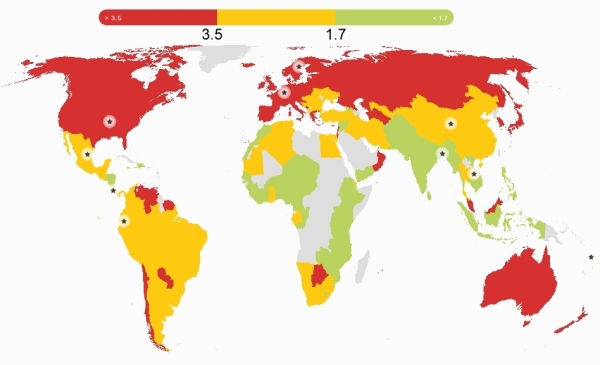Avid Geo-Mexico readers will know that we included a few paragraphs about the Happy Planet Index in our 2010 book, which we later quoted in this 2013 post, Mexico and the Happy Planet Index.
The latest (2016) Happy Planet Index (HPI), which uses slightly modified criteria, shows that Mexico has risen to 2nd place in the world rankings, behind Costa Rica, but ahead of Colombia, Vanuatu and Vietnam and well ahead of the U.S. (#108) and Canada (#85).
The Happy Planet Index is a compound index that combines four measures:
- life expectancy
- well being (life satisfaction)
- ecological footprint
- inequality
The HPI looked at data for 140 countries. For life expectancy, Mexico ranked #39, for well being #11, for ecological footprint #77 and for inequality #60.
The world map for ecological footprint shows the global pattern. The colors show three categories for ecological footprints, those below 1.7, those between 1.7 and 3.5 and those that exceed 3.5, where the numbers are global hectares (gha) per person.
These two sections from the Happy Planet Index country report for Mexico are a useful snapshot of where Mexico stands right now:
What’s working well in Mexico?
In recent years, massive steps have been taken to improve the health of the population of Mexico – notably achieving universal health coverage in 2012, making essential health services available to the entire population.
In 2014, a tax was imposed on sugary drinks with the express aim of tackling of obesity – this despite strong corporate opposition. The tax had already led to a 12% decrease in the consumption of such drinks by the end of the year.
Environmental sustainability is receiving growing political attention, and was included as one of five key pillars in Mexico’s National Development Plan for 2007–12. Mexico was the second country in the world to incorporate long-term climate targets into national legislation, and is taking important steps to conserve its forests and protect its rich biodiversity.
What could be improved?
Significant challenges remain for Mexico: economic inequality is a massive problem with a considerable gap between the richest and poorest – the top 20% of the population earns more than thirteen times as much as the bottom 20% of the population.
Mexico’s poverty rates are particularly high among indigenous people. Amnesty International has highlighted Mexico’s human rights violations, especially relating to irregular migrants. On top of these issues, the importance of the oil industry to Mexico’s economy complicates its environmental efforts.
Mexico recently reached cross-party agreement on the Pacto por Mexico, a pact of 95 initiatives aiming to tackle some of these issues – an important step for the country’s future.
The HPI attempts to quantify an alternative vision of progress where people strive for happy and healthy lives alongside ecological efficiency in how they use resources. Mexico may have a high happiness index, but (like the rest of the world) it still has an awful long way to go to ensure a sustainable future for our grandchildren.
Related posts:
2 Responses to “Mexico rises to 2nd on Happy Planet Index”
Sorry, the comment form is closed at this time.

Fascinating map! I’m surprised that Europe’s ecological footprint isn’t less. I can recall that they were already re-cycling 30 years ago and my impression was that the northern countries, especially, were very advanced, compared to the US e.g. What it sadly seems to say (the map) is that the richer the country, the worse we treat the planet. The more education, the more greed and disregard. Do you agree? Phyllis
I think maybe it’s the lack of education that leads to more greed and disregard ~ though this viewpoint will no doubt depend on what you take “education” to mean. Certainly, in my view, it is about far more than just gaining college degrees or coming high in the world rankings. We need an education that results in planet-friendly people.